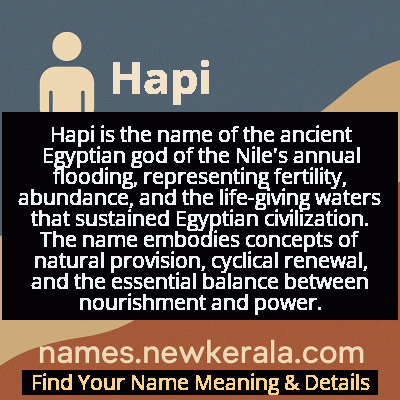Hapi Name Meaning & Details
Origin, Popularity, Numerology Analysis & Name Meaning of Hapi
Discover the origin, meaning, and cultural significance of the name HAPI. Delve into its historical roots and explore the lasting impact it has had on communities and traditions.
Name
Hapi
Gender
Male
Origin
Egyptian
Lucky Number
7
Meaning of the Name - Hapi
Hapi is the name of the ancient Egyptian god of the Nile's annual flooding, representing fertility, abundance, and the life-giving waters that sustained Egyptian civilization. The name embodies concepts of natural provision, cyclical renewal, and the essential balance between nourishment and power.
Hapi - Complete Numerology Analysis
Your Numerology Number
Based on Pythagorean Numerology System
Ruling Planet
Neptune (Ketu)
Positive Nature
Intuitive, analytical, spiritual, and inquisitive.
Negative Traits
Secretive, reserved, aloof, and can be overly critical.
Lucky Colours
Green, yellow.
Lucky Days
Monday.
Lucky Stones
Cat’s eye, moonstone.
Harmony Numbers
1, 5, 6.
Best Suited Professions
Scientists, researchers, spiritual leaders, detectives.
What People Like About You
Depth of knowledge, analytical skills, spirituality.
Famous People Named Hapi
Hapi
Ancient Egyptian deity
God of the annual Nile flooding and fertility, essential to Egyptian agriculture and survival
Hapi (historical figure)
Egyptian official
Middle Kingdom administrator documented in tomb inscriptions for managing Nile resources
Hapi Son of Horus
Funerary deity
Protector of lungs in canopic jars, crucial figure in Egyptian mummification practices
Name Variations & International Equivalents
Click on blue names to explore their detailed meanings. Gray names with will be available soon.
Cultural & Historical Significance
In funerary contexts, Hapi's role as one of the Four Sons of Horus connected him to the afterlife journey. He protected the lungs of the deceased, which were stored in canopic jars with lids shaped like baboon heads. This dual association with both life-giving abundance and death rituals reflects the Egyptian worldview that saw existence as a continuous cycle. Hapi embodied the understanding that the same natural forces that sustained life also facilitated transition to the afterlife, making him a deity who governed the most fundamental aspects of Egyptian existence from agricultural prosperity to spiritual salvation.
Extended Personality Analysis
People named Hapi often embody characteristics of abundance, nurturing, and natural wisdom. They tend to be deeply connected to cycles and rhythms, understanding that everything has its season and proper timing. Like the Nile's predictable yet powerful flooding, Hapi individuals often demonstrate reliability combined with transformative energy—they can be steady presences who nonetheless bring significant change to situations. Their nurturing nature makes them excellent caregivers, community supporters, and environmental stewards who understand the importance of sustainable abundance.
These individuals typically possess a calm exterior that masks considerable inner strength and resilience. They flow through challenges with grace but can become formidable when fundamental values or resources are threatened. Hapi-named people often serve as emotional and practical anchors in their social circles, providing stability and nourishment to relationships and projects. Their personality reflects the deity's dual nature—both gentle provider and powerful force of nature—making them adaptable yet principled individuals who understand the balance between giving and boundaries, between flexibility and core stability.
Modern Usage & Popularity
In contemporary naming practices, Hapi remains an uncommon but meaningful choice, primarily selected by parents with specific interests in Egyptian history, mythology, or those seeking a unique name with profound cultural roots. The name sees occasional use in academic and Egyptology circles, among families of Egyptian heritage preserving cultural traditions, and by parents attracted to nature-based names with historical significance. While it doesn't rank on mainstream baby name charts in English-speaking countries, it maintains a consistent presence as a distinctive masculine option that conveys strength, natural power, and connection to life-sustaining forces. Modern usage often emphasizes the name's environmental connotations and its representation of abundance and cyclical renewal, making it particularly appealing to families valuing sustainability, natural rhythms, and historical depth in their naming choices.
Symbolic & Spiritual Meanings
Hapi symbolizes the fundamental life force that sustains civilization through natural abundance and the careful balance of elemental powers. The name represents the concept of provision—the understanding that nature offers what is essential for survival when respected and properly managed. Symbolically, Hapi embodies the cyclical nature of existence, where periods of abundance and scarcity, life and death, creation and dissolution follow natural rhythms that ultimately maintain balance. The deity's association with both the life-giving Nile floods and funerary practices adds profound layers of meaning about continuity, transformation, and the eternal flow between different states of being. Hapi serves as a powerful metaphor for resources that sustain communities, the responsibility of stewardship, and the recognition that true abundance comes from understanding and working with natural cycles rather than attempting to dominate them.

